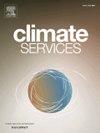使用气候信息服务对小农福利的影响:来自加纳腰果生产中心的证据
IF 4.5
3区 环境科学与生态学
Q2 ENVIRONMENTAL SCIENCES
引用次数: 0
摘要
本研究探讨了气候信息服务(CIS)的来源、CIS的性质以及使用CIS对小农腰果种植者福利的影响。通过对 CIS 的来源、类型和性质进行描述性统计,该研究在影响分析中结合使用了内生转换回归(ESR)和反概率加权回归调整(IPWRA)。结果发现,农民使用的主要 CIS 来源是广播。农民还回答说他们能及时收到气候信息。此外,我们还发现,教育程度、家庭规模、气候灾害、农民协会、农场规模、获得推广服务的机会、气候和无线电拥有量对使用 CIS 的可能性有积极影响。ESR 模型的结果表明,尽管 CIS 增加了家庭膳食多样性(HDD),但使用 CIS 会减少资产、农业净收入和产量。通过 IPWRA 模型,我们还发现,与不使用 CIS 的家庭相比,使用 CIS 的家庭更缺乏粮食安全,这一结果与上述 HDD 结果相矛盾。这项研究强调了对农业经济学的重要影响,尤其是对小农腰果种植者如何获取和使用气候信息服务(CIS)的影响。虽然气候信息服务旨在帮助农民适应气候变异性,但本研究揭示了自相矛盾的结果,与不使用气候信息服务的农民相比,使用气候信息服务的农民表现出较低的资产价值、农业净收入和产量,同时粮食更不安全。这些研究结果表明,如果没有足够的支持和补充资源,仅使用 CIS 可能不足以改善福利。本文章由计算机程序翻译,如有差异,请以英文原文为准。
The impact of use of climate information services on smallholder welfare: Evidence from the hub of cashew production in Ghana
This study examined the sources of climate information services (CIS), nature of CIS as well as impact of use of CIS on the welfare of smallholder cashew farmers. Using descriptive statistics for the sources, types and the nature of CIS, the study employed a combination of endogenous switching regression (ESR) and inverse probability weighted regression adjustment (IPWRA) in the impact analysis. From the results, we find that the main source of CIS used by farmers was radio. The farmers also responded that they received the climate information on time. In addition, we find that education, household size, climate disaster, farmer association, farm size, access to extension services, climate, and radio ownership had positive effects on the likelihood of using CIS. The results from the ESR model showed that use of CIS decreased assets, net farm income and yield even though it increased household dietary diversity (HDD). From the IPWRA model, we also find that users of CIS are more food insecure vis-à-vis non-users, a result which contradicts the aforementioned HDD results. The study highlights critical implications for agricultural economics, particularly in how smallholder cashew farmers access and use climate information services (CIS). Although CIS is meant to assist farmers in adapting to climate variability, this study reveals paradoxical outcomes, with users of CIS exhibiting lower asset values, net farm income, and yield, alongside greater food insecurity than non-users. These findings suggest that use of CIS alone, without adequate support and complementary resources, may not be sufficient to improve welfare.
求助全文
通过发布文献求助,成功后即可免费获取论文全文。
去求助
来源期刊

Climate Services
Multiple-
CiteScore
5.30
自引率
15.60%
发文量
62
期刊介绍:
The journal Climate Services publishes research with a focus on science-based and user-specific climate information underpinning climate services, ultimately to assist society to adapt to climate change. Climate Services brings science and practice closer together. The journal addresses both researchers in the field of climate service research, and stakeholders and practitioners interested in or already applying climate services. It serves as a means of communication, dialogue and exchange between researchers and stakeholders. Climate services pioneers novel research areas that directly refer to how climate information can be applied in methodologies and tools for adaptation to climate change. It publishes best practice examples, case studies as well as theories, methods and data analysis with a clear connection to climate services. The focus of the published work is often multi-disciplinary, case-specific, tailored to specific sectors and strongly application-oriented. To offer a suitable outlet for such studies, Climate Services journal introduced a new section in the research article type. The research article contains a classical scientific part as well as a section with easily understandable practical implications for policy makers and practitioners. The journal''s focus is on the use and usability of climate information for adaptation purposes underpinning climate services.
 求助内容:
求助内容: 应助结果提醒方式:
应助结果提醒方式:


